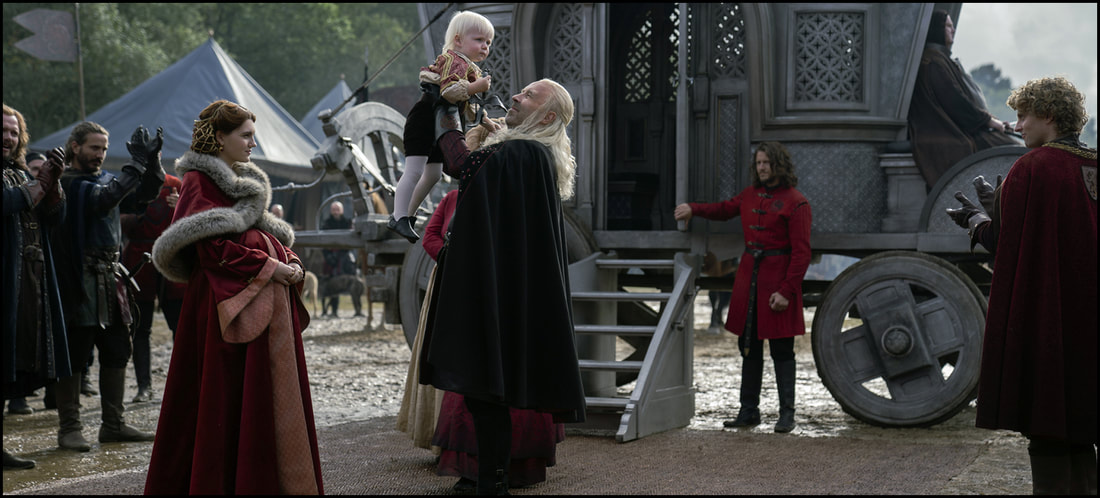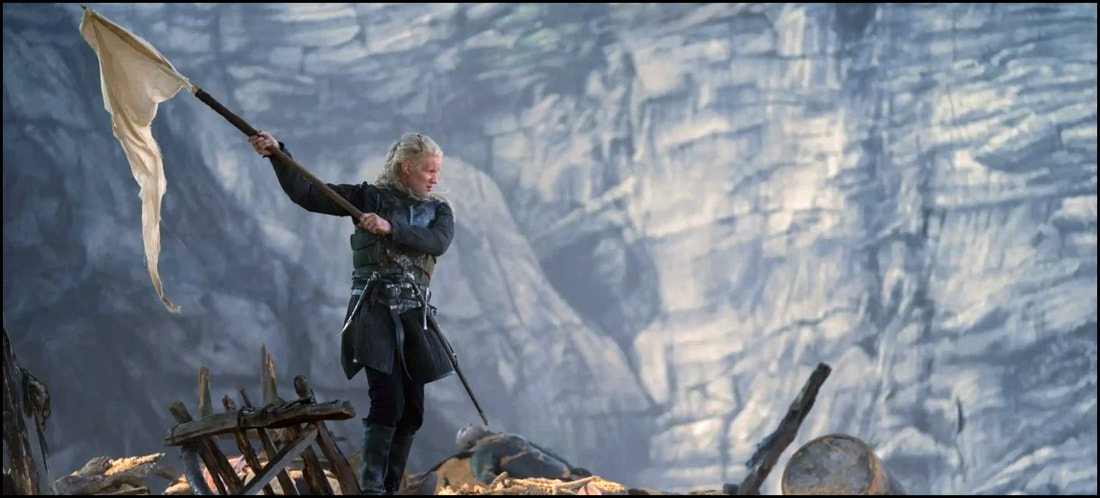Might I simply start out with saying: “Poor Viserys!”
Though Mel Brooks many moons ago wooed movie audiences to leadership’s various blessings with the phrase “It’s good to be king,” methinks the current state of affairs for the Dragon house’s lord would prove otherwise. In the scope of three episodes, this Westeros leader has lost his wife, his nearly born son, his brother has deserted him, and allies are presently either fleeing or in conflict. So why not take a holiday with what’s left of the fragile family, slay a deer (with heavy assistance), get drunk, and pledge the throne to his two-year-old son … the same throne he’s already promised to Rhaenyra, who is proving to be more than he can handle as a father anyway. Why, it’s enough to drive a man bonkers … and that certainly seems to be the direction this weary, white-haired chief is heading.
Sadly, with this third installment, this Game Of Thrones prequel is already showing its age.
Now, I’m well aware that there’s a bit of a history with mental illness in the Targaryen family. Lest I be accused of being insensitive by readers, let me remind you that these are fictional characters; and, thus, I feel free to say what I may about them and their collective malady. Certainly, Daenerys had her emotional hang-ups – ones that led to the near-torching of an entire city in Thrones’ big finale. As I mentioned in my review of “The Rogue Prince,” Rhaenyra isn’t coming off as what I’d call ‘psychologically grounded,’ either; and I’m guessing that apple – at this point – might be the whole tree. We’ll just have to see what develops.
However, there are plenty of weaknesses inherent in covering too much too fast, not the least of which requires the audience to pay more attention than is typically required of any serialized drama. If the passage of time isn’t shown amongst the key players in some fashion, then a program runs the risk of confusing the audience even further. While these years have most decidedly been unkind to the king, Rhaenyra’s overall look hasn’t shifted in the slightest; and I’m finding the visual aesthetics between the father and daughter a bit jarring as of late. (He’s aged, she’s not. Granted, she’s much younger, but it’s still distracting.) The supporting players might be sporting a bit more gray or white (it’s hard to say given the preponderance of light-colored wigs). Still, this aging process could’ve been handled better with greater demonstration from the make-up and costumes department. Every little bit helps.
That said, Daemon’s character takes a huge leap forward in “Second Of His Name,” a development that bodes well for his prospects to retake the Iron Throne.
The first episode essentially painted the man as a bit of a braggard and a bully, showing audiences even a bit of thuggery as he and his troops went about the business of whipping Westeros into shape. We saw thieves lose their hands. We saw rapists lose their … well … you guessed it. And we were treated to other such excesses of magisterial might meant to scare the residents into following the law or else. Again, this was accomplished with troops, so not all of the dirty deeds were directly performed by the king’s brother, though it was clearly implied as to who was calling the shots.
But “Second Of His Name” finally gave viewers a portrait of how ruthless this young lord could be: seeking an end to hostilities between these Westeros rebels and the rising Triarchy, Corlys Valeryon coaxes Daemon to make a final stand against the Crabfeeder and his armies. Strategically, Daemon’s ‘sacrifice’ on the field of battle will serve as a distraction to draw their enemies out of the caves where they’ve found shelter against the storm. It’s a daring gambit, but leave it to a Valeryon to know good and well that a Targaryen might just be crazy enough to both accept the challenge and make it work. Thankfully, it does work, giving Daemon the opportunity to truly show viewers what he’s physically capable of without the intervention of his trained men … no doubt serving as an inspiration for what’s yet to come in all of the Seven Kingdoms.
It was a big and cinematic moment – one that tipped the balance back in favor of spectacle over substance – but we’ll have to see where this journey ultimately takes us in order to know whether or not it pays off for audiences.
-- EZ



 RSS Feed
RSS Feed